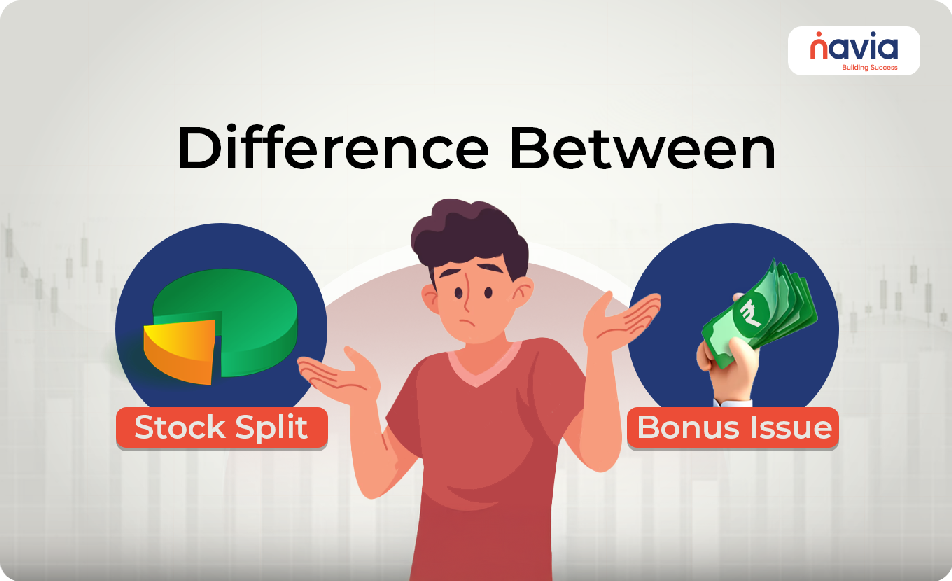Difference Between Stock Split and Bonus Issue

In the stock investing world corporations take strategic decisions like stock splits and bonus issues to reward existing shareholders. The two ways seem similar, and they have the power to increase the number of shares in circulation. They both have distinct mechanics, purposes, and implications. Are you ready to explore it?
This blog will help you to understand the difference between stock splits and bonus issues, how they work, advantages and disadvantages, and the impact on share prices. Whether you are a new investor or seasoned investor, it is necessary to get knowledge about bonus issues vs stock split.
What is Stock Split?
A stock split is considered a corporate action where a company divides their existing shares into multiple shares to improve liquidity. Unlike bonus shares, a stock split doesn’t require capital reserves; it simply changes the face value and number of existing shares.
For example,
In a 2-for-1 stock split, each shareholder receives two shares for every one held. So, if you held 100 shares at ₹100 each, post-split, you would hold 200 shares at ₹50 each. The total investment value remains the same.
What is Bonus Share?
Bonus shares are the additional shares that are issued by a company to their existing shareholders without any additional cost. For instance, if a company announces a 1:1 bonus issue, it means their shareholders will receive one additional share for every share they hold.
Why do companies issue bonus shares? Bonus issues are announced when the company has accumulated substantial reserves and wants to reward its shareholders without impacting cash flows. It will improve stock liquidity and also make shares affordable to retail investors.
Pros And Cons of a Stock Split
| Pros | Cons |
| Lower per-share price will make the stock more accessible to retail investors | No change in company’s market capitalization |
| The increased number of shares offer higher trading volumes | Increased liquidity may result in short-term volatility |
| The lower share price will attract more attention of investors | Involve costs related to record-keeping and share reconstructing |
| It’s a positive signal that suggesting the company experiencing growth | It attracts peculative traders who are focusing on short=term price movements, that will make volatility |
Pros and Cons of a Bonus Issue
| Pros | Cons |
| It’s a sign of the company’s financial health, so they reward their shareholders through a bonus issue | Investors don’t receive actual cash, they can only get additional shares |
| The shares in the market can enhance its trading volumes | The number of shares increases the EPS (Earnings Per Share) will decline |
| It signals company stability and that enhance investor confidence in future earnings | The additional share distribution will impact the company’s financial performance |
| Bonus shares do not lead to tax liabilities like cash dividends | Sometimes it attracts short=term traders, which lead to volatility and misalignment with long-term value creation. |

Stock Split vs Bonus Issue
| Feature | Stock Split | Bonus Issue |
| Purpose | To increase liquidity of shares | To reward shareholders |
| Market Perception | More accessible to small investors | Positive sign of the company health |
| Impact of EPS (Earnings Per Share) | Shares are divided into multiple shares, but no change occurs in the company’s earnings | The number of outstanding shares increases, but net profit remains unchanged |
| Investor Benefit | More affordable share price | Free additional shares |
| Example | A company stock is trading at ₹1,000 per share, and it announces a 2-for-1 stock split. This means every shareholder will receive two shares for each one they currently own. After the split, the stock price will drop to ₹500, but shareholders will now own twice the number of shares. So, if you had 10 shares worth ₹10,000 before, you’ll have 20 shares worth ₹10,000 after – the total value remains the same. | You own 100 shares of a company, and they announce a 1:1 bonus issue. This means for every 1 share you hold; you’ll receive 1 additional share. So, you’ll get 100 extra shares, taking your total to 200 shares. If the share price was ₹200 before the bonus, it will adjust to ₹100 after the issue – keeping the total value of your investment the same at ₹20,000. |
Bonus Issue and Stock Split: What is its Impact on Share Price?
From a financial standpoint, both a bonus issue and a stock split adjust the share price downward in proportion to the increase in shares.
For example;
ABC company’s stock is prices at ₹1000.
🠖 If they declare a 1:1 Bonus Issue, the share price is expected to adjust to ₹500, and the number of shares will double.
🠖 If they announce a 2-for-1 Stock Split, again, the price will adjust to ₹500 with twice the number of shares.
In simple words, market capitalization remains unchanged in both cases. This action will improve market sentiment and liquidity. While both result in increased share count, bonus shares vs stock split differs in origin and intent. Bonus issues come from a company’s saved-up profits and give extra shares to shareholders. Stock splits, on the other hand, simply divide existing shares to make the share price lower, without using any company profits.
Conclusion
Understanding the difference between bonus issues and stock splits is important for stock investors. Both aim to reward their shareholders and boost liquidity, but their structure and process may vary. In the short term, both can attract new investors and improve market sentiment, but savvy investors should focus more on a company’s fundamentals rather than these cosmetic changes alone.
Ready to invest smarter? Start tracking bonus issues and stock splits with Navia investment tools – Sign up today!
Do You Find This Interesting?
Frequently Asked Questions
What is the main difference between stock split and bonus issue?
Bonus shares are issues from company reserves while a stock split divides existing shares without affecting reserves.
Which is better – bonus share vs stock split?
It depends on the context; a bonus share indicates financial strength while stock split aims to make shares more affordable and liquid.
How do these affect the earnings per share (EPS)?
Both bonus issues and stock splits lead to an increase in the number of shares, which dilutes EPS unless earnings grow accordingly.
Are taxes applicable on stock splits or bonus issues?
There are no taxes at the time of issue. However, capital gains tax may apply when you sell the shares, depending on the holding period and gains.
Can a company give both stock split and bonus shares?
Yes, but usually not at the same time. Companies can issue both, depending on their goals and financial position.
DISCLAIMER: Investments in the securities market are subject to market risks, read all the related documents carefully before investing. The securities quoted are exemplary and are not recommendatory. Brokerage will not exceed the SEBI prescribed limit.






